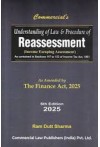
- Author(s): Ram Dutt Sharma
- Publisher: Commercial Law Publishers (India) Pvt Ltd
- Edition: 6 Ed 2025
- ISBN 13 9789356038165
- Approx. Pages 510 + Contents
- Format Paperback
- Approx. Product Size 24 x 16 cms
- Delivery Time 3-5 working days (within Kerala & South India) (Others 7-9 days)
- Shipping Charge Extra (see Shopping Cart)
........................................................................................................................
Description
Escapement of income chargeable to tax is a subject with very wide dimensions. It may arise either because of the failure of the person liable to tax to file the return of income or because of non-disclosure of income from certain source or because of any of the situations specified in Explanation 2 to section147. The legislature has taken care to ensure that no harassment is caused to taxpayers or that the completed assessments are not reopened without valid reasons. The Assessing Officer is, therefore, statutorily required to record reasons for formation of belief that income chargeable to tax has escaped assessment. The sanction of higher authority is also necessary. Cases beyond four years from the end of the relevant assessment year cannot be re-opened unless there is further finding that such escapement of income has occurred because of the assessee's failure to disclose fully and truly all material facts relevant for assessment. These are some of the measures enshrined in the Income-tax Act to prevent harassment to the taxpayers.
Assessing Officers are familiar with the provisions relating to "income escaping assessment", i.e., section 147. This is commonly known as reassessment. However, it is seen that many times, the scope of section 147 is not understood correctly. As a result, this section is often resorted to even in cases when it is not followed correctly. There are many instances where assessments made under section 147 have been cancelled by the appellate authorities on the ground of being invalid. It is necessary that this section is properly understood.
Thus, section 147 has assumed great importance. To write a book on such a subject, even satisfactorily, leave alone comprehensively, is a difficult task. In this book an attempt has been made to explain the provisions relating to assessment and re-assessment. I have tried to discuss in this book the basics of section 147 and as many relevant issues as possible. This book, at best, can be claimed to give some glimpses of a vast subject like section 147 and not an exhaustive exposition on the subject.
It is, therefore, I got opportunity to prepare on a book for exchanging thoughts on "Reopening of assessment" for Department as well as for Professionals. I endeavoured this attempt and left no stone unturned to bring out in depth analysis and research on this subject. This book covers an extensive analysis on the reassessment provisions in the light of landmark judgements.
.........................................................................................................................
Contents
1. Introduction
2. Income Escaping Assessment [Section 147]
3. Issue of Notice Under section 148 where Income has Escaped Assessment [Section 148: As substituted by the Finance (No. 2) Act, 2024, with effect from 01.09.2024]
4. Issue of Notice under section 148 Where Income has Escaped Assessment [Section 148: As applicable upto 31.08.2024]
5. Issue and Service of Notice under section
6. Notices under section 148 barred by Limitation
7. Notice in the Name of Deceased Assessee in Reassessment Proceeding
8. Reassessment - Notice Against Non-existent Entity – Validity
9. Notice Deemed to be Valid in Certain Circumstances [Section 292BB]
10. Issuance of Notice Under Section 143(2) in Reassessment Proceedings
11. Procedure before issuance of notice under section 148 [Section 148A: Applicable with effect from 01.09.2024]
12. Procedure before issuance of notice under section 148 [Section 148A: Applicable upto 31.08.2024]
13. Prior approval for assessment, reassessment, or recomputation in certain Cases [Section 148B]
14. Time Limit for Notices under Sections 148 and 148A [Section 149: Applicable from 01.09.2024]
15. Time Limit for Issue of Notice Under Section 148 [Section 149: Applicable from 31.08.2024]
16. Provision for Cases where Assessment is in Pursuance of an Order on Appeal, etc. [Section 150]
17. Sanction for Issue of Noticeunder Section 148 [Section 151]
18. Faceless Assessment of Income Escaping Assessment [Section 151A]
19. Other Provisions [Section 152]
20. Time Limit for Completion of Assessment, Reassessment and Re-computation [Section 153]
21. Effect of Re-opening the Assessment Based on Wrong Facts or Conclusions
22. Reopening of Assessment and Maintainability of Writ Petition
23. Reopening beyond 4 years' failure to disclose fully and truly material facts necessary for assessment
24. Concept of Reason to believe
25. Doctrine of Change of Opinion
26. Offences and Prosecutions
27. Specimen of Reasons recorded for Reopening of Assessment
28. Important Board's Circulars and Instructions
29. Cases where Initiating Reassessment Proceedings Justified
30. Cases where initiating reassessment proceedings not justified
31. Cases where Reassessment Proceedings Justified on the Basis of Informations Received from other Agencies
32. Cases where Reassessment Proceedings not Justified on the Basis of Informations Received from other Agencies
33. Important case law on Reassessment
..........................................................................................................................
Author Details
Ram Dutt Sharma was born on 27 June, 1958 in Narnaul, Haryana. He got his post-graduation from M.D University, Rohtak in 1980. He joined the Income-tax Department on 18.01.1983 and retired as Income Tax Officer on 30.06.2018. He worked at various stations of North-West Region of Income-tax Department. He has wide experience of all wings of Income-tax Department such as Assessment Unit, Special Range, TDS Wing, Investigation Wing, etc. He has been Contributing articles such as in CBDT e-journal "Taxalogue", ITAT Online, Tax Guru and Writing of his own blog "ramduttsharma.blogspot. com". addressing on topics relating to Income Tax at NADT, Regional Campus and The Institute of Chartered Accountants of India, Tax Bar Associations etc. He has so far authored 44 books on Income Tax also.
